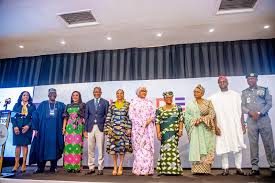The Federal Government has launched the Women Exporters in the Digital Economy Nigeria programme, a $50 million initiative designed to train, fund, and connect women-led businesses to international markets. The programme, unveiled on Thursday in Abuja, aims to position Nigerian women entrepreneurs as competitive players in the global digital economy.
Minister of Industry, Trade and Investment, Dr Jumoke Oduwole, said the project was developed in partnership with the World Trade Organisation (WTO) and the International Trade Centre (ITC). She noted that it will provide capital, technical expertise, and global networks to women-owned micro, small, and medium enterprises (MSMEs).
Oduwole explained that Nigeria recorded the highest participation among the four pilot countries — Jordan, Mongolia, the Dominican Republic, and Nigeria — with over 67,000 applicants. From this, 146 women-led businesses were selected to join the programme.
According to her, the Nigerian Export Promotion Council will spearhead local implementation. She described the initiative as a step towards ensuring women become “equal and proactive participants” in international trade rather than spectators.
The 18-month programme is expected to boost economic inclusion, generate jobs, and strengthen Nigeria’s role in digital trade under the African Continental Free Trade Area (AfCFTA).
WTO Director-General, Dr Ngozi Okonjo-Iweala, said the fund would provide women entrepreneurs with the knowledge, resources, and connections needed to thrive in global value chains. She disclosed that beneficiaries are split into two categories:
- Booster Track: 16 entrepreneurs will receive up to $30,000 each and intensive technical assistance.
- Discovery Track: 130 entrepreneurs will get up to $5,000 each and one year of business support.
Okonjo-Iweala emphasised that the selected entrepreneurs operate in diverse sectors, including fashion, tourism, agriculture, IT, furniture, beauty, and food processing. She highlighted that women who trade internationally earn, on average, 2.8 times more than those who operate locally, and digital trade could further multiply these opportunities.
She urged Nigeria to address challenges such as poor internet penetration, high connectivity costs, and unreliable power supply, while commending the country’s planned $2 billion fibre optic network project. She also called for policies that will expand Africa’s share in digitally delivered services, which currently stands at about 1 per cent globally.
The Minister urged the private sector, civil society, and development finance institutions to back the programme, stressing that women’s success in digital trade should be a national priority. She added that the government will work to improve digital literacy, ease access to finance, and reduce trade bottlenecks through e-commerce platforms and better logistics systems.
The $50 million fund is supported by the United Arab Emirates, the State of Qatar, and the FIFA–Qatar World Cup Legacy Fund.
